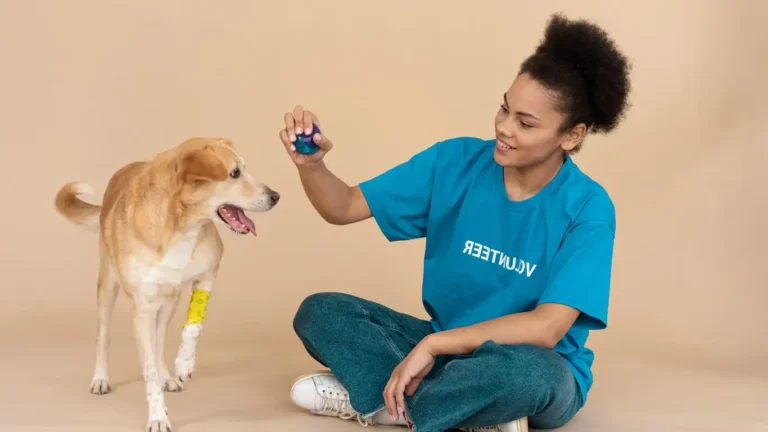Signs of Hormonal Imbalance in Dogs You Should Never Ignore
When it comes to keeping our pups happy and healthy, there are a lot of things we think about—diet, exercise, grooming… but have you ever paused to consider the signs of hormonal imbalance in dogs? It’s not exactly the first thing that pops into mind during a vet visit, but let me tell you from personal experience working as a veterinary assistant with a special focus on nutrition—hormones play a huge role in your dog’s behavior, health, and even how they respond to food. I’ve seen firsthand how subtle signs can go unnoticed until they start impacting quality of life. That’s why today, I want to break it all down for you in a way that’s easy to understand and practical to act on. Let’s dive into what to watch out for, and how your furry best friend might be trying to tell you something’s off.
What Exactly Is a Hormonal Imbalance in Dogs?

Let’s start with the basics. Hormonal imbalances happen when your dog’s endocrine system—yep, just like in humans—isn’t producing the right amount of hormones. This could mean too much or too little of something like cortisol, estrogen, thyroid hormones, or insulin. These hormones regulate everything from energy levels and metabolism to skin condition and even temperament.
When I was assisting at a small animal clinic, I remember this sweet, older Golden Retriever named Bella. Her owner brought her in thinking she was just “getting lazy with age,” but it turned out she had hypothyroidism. Once we got her treatment dialed in, she perked up and even started enjoying her walks again. That’s the kind of transformation we love to see!
Common Causes of Hormonal Imbalance in Dogs
There are a few reasons your pup might be struggling with hormonal health. Some causes include:
- Genetic predispositions (some breeds are more prone)
- Poor diet or nutrient deficiencies
- Spaying or neutering side effects
- Stress and environmental toxins
- Underlying medical conditions like Cushing’s disease or diabetes
It’s not always one-size-fits-all, which is why a personalized approach—including nutritional therapy—is so important.
Spotting the Signs of Hormonal Imbalance in Dogs

Here’s where your day-to-day observations as a pet parent really matter. You know your dog better than anyone. If something seems off, trust that gut feeling. Some signs can be subtle, but they’re your first clues that something’s not quite right under the hood.
Physical Symptoms
Let’s talk about some of the more visible indicators first. Keep an eye out for:
- Unexplained Weight Gain or Loss: Dogs with thyroid issues or insulin imbalances may gain or drop pounds fast.
- Thinning Coat or Hair Loss: Especially along the sides or tail—classic sign of thyroid problems or Cushing’s.
- Dry, Flaky Skin: Not just a grooming issue—it could be hormonal.
- Potbelly Appearance: Often seen in dogs with Cushing’s disease.
I remember a little dachshund named Max who came in with a belly that looked almost bloated. His energy was low and his coat had lost its shine. Sure enough, after some testing, he was diagnosed with hyperadrenocorticism (Cushing’s). The earlier you catch it, the better the outcome.
Behavioral Changes
Sometimes, the symptoms don’t show up on the outside first. Behavior shifts are another huge red flag:
- Sudden aggression or irritability
- Depression or withdrawal
- Restlessness at night
- Excessive thirst and urination
If your usually calm pup starts acting anxious or even snappy, don’t brush it off as “just a phase.” Hormonal shifts can wreak havoc on mood, just like they can in humans. I once had a case with a Boxer who went from playful to moody almost overnight. The culprit? Thyroid dysfunction.
The Role of Nutrition in Hormonal Health

Since nutrition is my jam, I have to say this—what your dog eats is one of the most important factors in preventing and managing hormonal imbalance. A balanced, species-appropriate diet supports endocrine function and helps the body regulate itself better.
Dogs dealing with thyroid issues may benefit from diets rich in selenium, zinc, and iodine (under veterinary guidance, of course). Those with adrenal imbalances? We often recommend a low-stress, anti-inflammatory food plan. And don’t forget about omega-3s—they’re essential for hormone production and skin health.
One of my clients had a senior Labrador, Daisy, who was struggling with skin issues and low energy. We adjusted her diet to include more healthy fats, added some tailored supplements, and honestly, the change was night and day. Daisy got her groove back—tail wags and all.
When to Talk to Your Vet (and What to Expect)

So, let’s say you’ve noticed a few symptoms from the lists above—what now? I always tell pet parents not to wait until things get “bad.” If you’re seeing signs of hormonal imbalance in dogs, even if they seem small, a vet visit is 100% worth it. Trust me, I’ve seen way too many cases where early detection could’ve saved months of discomfort and expensive treatments.
Your vet will probably start with a full physical exam, followed by blood work. They might recommend a thyroid panel, cortisol level check, or even an ACTH stimulation test depending on what symptoms your dog is showing. Don’t worry, none of this is as scary as it sounds.
In my clinic days, I used to prep dogs for these blood draws all the time. Some would get nervous (understandable!), but with some treats and a little patience, we’d get it done quickly and gently. And once the results are in, you’ll have a clear picture of what’s going on under the surface.
Questions You Should Ask Your Vet
- What hormone levels are off, and what does that mean for my dog?
- Are there any medications or supplements you recommend?
- How will my dog’s diet or routine need to change?
- What’s the expected timeline for improvement?
- Should we do follow-up tests, and how often?
Don’t be shy about asking questions! Being proactive is part of being a great pet parent, and it helps your vet tailor care to your pup’s unique needs.
Hormonal Disorders Every Dog Owner Should Know

Let’s dive into some of the more common conditions you might hear about when talking hormones. Knowing the names can help things click when your vet starts tossing around terms.
Hypothyroidism
This one is super common, especially in middle-aged to senior dogs. It basically means the thyroid gland isn’t producing enough hormone. Symptoms? Low energy, weight gain, hair thinning, and even a little doggy depression. It’s usually manageable with daily medication (levothyroxine is the most common).
Hyperthyroidism
Less common, but it can happen—usually from a thyroid tumor. Dogs may lose weight, have increased appetite, and get restless. This one definitely requires vet intervention and sometimes surgery or radiation treatment.
Cushing’s Disease (Hyperadrenocorticism)
Caused by the adrenal glands producing too much cortisol, this condition often shows up as a “potbelly,” excessive thirst, increased urination, and hair loss. It can be tricky to diagnose, but I’ve seen dogs bounce back beautifully with the right meds and monitoring.
Addison’s Disease (Hypoadrenocorticism)
The opposite of Cushing’s. Dogs with Addison’s don’t make enough cortisol. Symptoms can include vomiting, diarrhea, lethargy, and even collapse in severe cases. It sounds dramatic, but again, treatment exists—usually a combo of hormone replacement and regular monitoring.
Diabetes Mellitus
Yup, insulin is a hormone too. Diabetes affects hormone regulation and is another reason why you might see behavioral or physical changes. Dogs with diabetes might drink and pee more often, lose weight despite eating, or act lethargic.
Holistic and Lifestyle Support for Hormone Balance

As someone who’s worked with a lot of health-conscious pet parents, I always say conventional treatment is essential—but don’t underestimate the power of lifestyle support. Hormones are sensitive to more than just medication. Here’s where a holistic approach can work wonders alongside vet-prescribed care.
Nutrition Tweaks That Make a Difference
You already know I’m big on nutrition, but let’s break down what that really looks like:
- High-quality protein to support muscle and metabolic functions
- Healthy fats like omega-3s for brain and hormone health
- Limited carbs to keep weight in check and avoid sugar spikes
- Fresh, whole foods if possible—think gently cooked or raw (if guided by your vet)
- Supplements like probiotics, B vitamins, and glandular support
One family I worked with had a rescue shepherd named Luna who was diagnosed with early-stage hypothyroidism. Along with her meds, we added kelp, omega oils, and switched to a gently cooked diet. Her coat improved so much, even her groomer commented on it!
Stress Management for Hormonal Harmony
Don’t underestimate stress—it’s a hormone disruptor in dogs too. Chronic stress can affect the adrenal glands, digestion, and immune system. Whether it’s loud noises, chaotic environments, or lack of routine, these factors chip away at your pup’s balance.
Simple changes can make a huge impact:
- Daily walks (not just for exercise, but sniffing time too!)
- Consistent routines—dogs love predictability
- Calming supplements like L-theanine or CBD (always vet-approved)
- Interactive toys and puzzle feeders for mental stimulation
I had a client whose nervous Border Collie was showing hormonal signs, and once we added daily structured play and calming support, her levels improved alongside medical treatment. It really is a full-circle approach.
Monitoring Your Dog Over Time
Once your dog is diagnosed or even just being monitored for possible hormonal issues, consistency is everything. You’ll want to keep an eye out for recurring or new symptoms, and most vets will suggest follow-up labs every few months at first.
Keep a little health journal or note on your phone: jot down changes in behavior, appetite, weight, energy, or appearance. That info is golden when your vet’s trying to assess progress or catch early warning signs.
And hey, you don’t have to do it all alone! Your vet team is there to help, and if you’ve got someone like me who’s focused on nutrition and wellness support, lean on us. We’re in your dog’s corner too.
Creating a Long-Term Plan for Your Dog’s Hormonal Health

So, you’ve identified the signs of hormonal imbalance in dogs, worked with your vet, and started a treatment or support plan—awesome! But what now? The truth is, hormonal conditions are often lifelong companions. That doesn’t mean your dog can’t live a happy, full life. It just means you’ll want to stay consistent, stay informed, and stay connected with your care team.
From what I’ve seen working in clinics and with wellness-focused pet parents, dogs thrive with a proactive plan. That includes regular checkups, small lifestyle tweaks, and sometimes just keeping a closer eye on their energy, mood, and appetite. Once you know what to look for, managing it becomes second nature.
Key Elements of an Ongoing Hormonal Health Plan
- Routine blood work every 3–6 months (frequency depends on condition)
- Consistent medication or supplement schedules
- Nutritional adjustments as your dog’s needs evolve
- Monitoring behavior and mood changes
- Limiting exposure to hormone-disrupting chemicals like pesticides or artificial additives
One of the best success stories I remember was with a spunky little Pomeranian named Trixie. Her adrenal imbalance had her acting totally unlike herself—low energy, anxious, and losing fur like crazy. Her owner stuck to a vet-guided plan, added some nutrition and holistic support, and after a few months? Trixie was back to her bossy, bouncy self.
How Hormonal Health Affects More Than Just the Body

Let’s be real—hormones don’t just mess with your dog’s body. They mess with their entire vibe. Mood swings, clinginess, weird aggression, or even fearfulness can all trace back to hormonal fluctuations. It’s something I wish more people understood before jumping to behavioral training or discipline.
I had a case a few years back where a normally mellow Lab mix started snapping at her housemate—a Chihuahua she’d lived with peacefully for five years. Everyone assumed it was a dominance issue, but I recommended a hormone panel just in case. Boom—undiagnosed hypothyroidism. Once treatment began, harmony was restored (and the Chi stopped hiding behind the couch).
This is why understanding the deeper connection between health and behavior is so important. Hormones influence everything from sleep quality to how your dog interacts with you and other pets. Balanced hormones = a more stable, happy pup.
Helpful Signs That Treatment Is Working
- Steady weight and energy levels
- Improved coat condition
- Regular appetite and digestion
- Consistent mood and behavior
- Normal thirst and urination patterns
Keep in mind, results don’t happen overnight. Some dogs respond within weeks, while others may take a few months. Be patient and celebrate the small wins—like the day your dog actually finishes a walk without dragging their paws. That’s progress!
Resources You Can Trust for Ongoing Education
As a pet parent, staying informed is one of the best things you can do. I always recommend sticking with reputable, science-backed sources. Here are some of my go-to’s, both as a former vet assistant and a lifelong dog lover:
- PetMD – Great for digestible medical info
- American Kennel Club (AKC) – Breed-specific health insights
- National Institutes of Health (NIH) – For broader hormone research
- Health.com – For general hormone balance topics
Another tip? Find a community! Whether it’s a Facebook group for owners managing Cushing’s disease or a raw feeding forum focused on endocrine health, connecting with others can be encouraging and incredibly helpful.
Final Thoughts (But Not a Goodbye!)
Just to wrap it all up: hormonal imbalance in dogs is more common than most people think—and it’s nothing to panic about. With the right guidance, ongoing care, and a little extra attention, your dog can thrive. The biggest takeaway I want to leave you with? Be your dog’s advocate. You know them best. If something feels off, speak up, ask questions, and dig deeper until you get answers that make sense.
And hey, if your pup ends up needing lifelong hormone support, that’s okay. They’re lucky to have someone like you in their corner. From all my years in the clinic, I can tell you—some of the happiest, healthiest dogs I’ve seen were the ones with committed, informed, and loving humans beside them every step of the way.
Disclaimer
This article is for informational purposes only and is not intended to replace professional veterinary advice, diagnosis, or treatment. Always consult with a licensed veterinarian regarding any medical concerns related to your pet.






